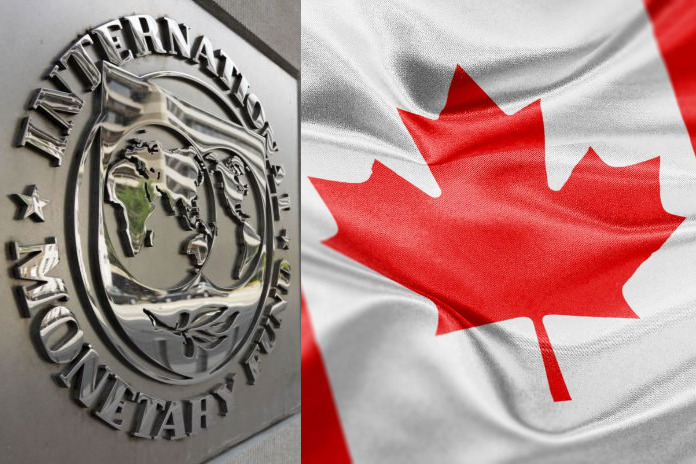WASHINGTON, USA – The executive board of the International Monetary Fund (IMF) concluded the Article IV consultation with Canada and considered and endorsed the staff appraisal without a meeting.
The Canadian economy is decelerating, accompanied by a sharp decline in headline inflation. But, as in other similar countries, core inflation has been stickier, and short-term expectations remain elevated against the background of still-tight labor markets. Meanwhile, the financial system appears broadly resilient, despite global banking stresses and ongoing mortgage resets at higher interest rates, and the housing market is rebounding again, partly reflecting the substantial increase in immigration.
Growth registered 3.4 percent in 2022, slowing sharply at the end of the year before rebounding in Q1:2023, driven primarily by strong trade and consumption. Looking ahead, the contractionary stance of monetary and fiscal policies is expected to slow activity, with growth declining to 1.7 percent this year. Headline inflation fell from its June 2022 peak of 8.1 percent to 3.4 percent by May 2023, benefiting from significant base effects associated with energy prices, while core inflation has declined more moderately, from around 6 percent last year to 3.7 percent in May. With continued tight policies and slowing growth, inflation is expected to approach the 2-percent target by end-2024.
With the world moving from one crisis to the next, risks to a highly open economy like Canada are substantial and compound domestic vulnerabilities related to inflation expectations, the housing market, and household leverage. The outlook thus remains uncertain, and shocks could push the economy into a mild recession.
Looking further ahead, the government is positioning Canada as a reliable supplier of critical minerals and energy and has had some success in attracting some major new green investments. Key long-term challenges relate to further strengthening the investment climate, boosting productivity growth, and implementing Canada’s ambitious policies to achieve its climate mitigation targets.
The economy is slowing, but disinflation still has a way to go. Policy tightening is feeding through to the economy. Growth is gradually slowing, although the housing market is rebounding again, while the financial sector has so far been largely resilient to the domestic cycle as well as to global financial stress. Headline inflation has come down substantially, but core inflation has been slower to move, as the labor market is still tight and near-term expectations remain elevated. The external position in 2022 was moderately weaker than the level implied by medium-term fundamentals and desirable policies. The outlook is subject to important downside risks, and shocks could tip the economy into a mild recession.
Tight macro policies thus remain necessary. Assuming the economy evolves in line with baseline projections, monetary policy should remain restrictive, but it will be important for decisions to remain data-dependent. Quantitative tightening should continue, while some further enhancements to monetary policy communication could be pursued. Fiscal consolidation is proceeding, although at a slower pace than previously envisaged, partly reflecting welcome new spending initiatives introduced in the 2023 budget. While Canada has fiscal space to accommodate these initiatives, care will need to be taken that fiscal policy supports inflation reduction goals.
A quantitative fiscal framework, including a specific debt anchor and a supporting operational rule, would enhance policy credibility and communication, while helping to assess the tradeoffs between spending needs and the pace of consolidation. Given the recent rebound in housing prices, measures to promote housing affordability, particularly through increased supply, remain necessary.
Current challenges in the financial sector underscore the importance of enhancing policies in a number of areas. The Canadian financial sector faces risks on several fronts, including from high household leverage and housing market developments, from rising interest rates, and from global banking stresses. While the sector has remained resilient to date, there is scope to strengthen capital and liquidity requirements on smaller banks and to expand the stress testing of NBFIs.
Progress continues to be made on the 2019 FSAP recommendations, but recent global market volatility has underscored the importance of addressing persistent issues of data gaps and fragmentation. Canada’s AML/CFT framework is generally appropriate but further focus could be placed on the assessment and mitigation of cross-border money laundering risks, particularly in the banking and real-estate sectors. The proposed establishment of a Canada Financial Crimes Agency is welcome, as are steps to move toward establishing beneficial-ownership registries.
Structural challenges need to be addressed. Productivity growth must be enhanced and the investment climate made more attractive. Canada is currently among the world’s top-ten emitters of greenhouse gases, but announced climate mitigation policies should go a long way toward delivering its NDCs. Adverse competitiveness implications of these policies may be significantly mitigated by exchange rate flexibility and by well-designed recycling of carbon tax revenues, and any remaining effects could be addressed through international cooperation, such as on a carbon price floor. Green industrial policies can help the economy to transition and maybe a needed response to policies of major trading partners, but their design poses some risks. Meanwhile, Canada should continue to eschew approaches that distort trade.





